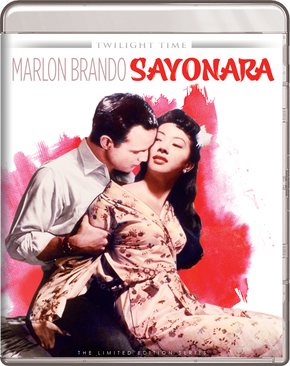Marlon Brando headlines this Eastern romance that explores racial prejudice

In the past 60 years we have progressed as a society in many ways, while remaining sadly stagnant in others. This year particularly has even seen a regression, a return to a blinkered viewpoint in terms of race and religion. On its release in 1957, Sayonara sought to celebrate two cultures and elegantly challenge ideas of racism and prejudice. The beauty of the film is showcased in a stunning new release from Twilight Time, one that sadly reminds us how necessary its themes are to challenge outdated viewpoints.
Synopsis
A romantic drama openly dealing with racism and prejudice, Sayonara (1957) stars Marlon Brando as an Air Force major who falls in love with a Japanese actress (Miiko Taka) while stationed near Kobe, Japan during the Korean War. Like his crew chief, Joe (Red Buttons) — just married to a Japanese woman (Miyoshi Umeki) — the Major suddenly finds himself having to contend with a cruel military policy and an all-but-general bias against miscegenation. Sensitively directed by Joshua Logan, and featuring a superlative Franz Waxman score and a celebrated title song by Irving Berlin.

Set a few years after the end of the Second World War and the onset of the Korean War, U.S. Air Force Major Lloyd “Ace” Gruver (Marlon Brando) finds himself deployed to Japan where, despite his engagement to long-time love Eileen Webster (Patricia Owens), he falls for local actress Hana-ogi (Miiko Taka). While already conflicted in pursuing this relationship, problems are compounded by the military clamping down on interracial relationships. A fellow officer has found himself passed over for promotion and persecuted ever since he married a Japanese woman. Gruver soon finds himself in a similar predicament, as his own prejudices are challenged by his burgeoning relationship with Hana-ogi.
The tale has shades of Madame Butterfly, but it is certainly far less theatrical, a more tempered tragedy. For its time, it’s surprisingly incisive and nuanced. Even recent films have dealt with such issues in a far more heavy handed manner. It’s refreshing how genuinely sensitive Sayonara is, beautifully filmed on location in Japan with lots of traditional flourishes and superb framing to showcase scenes, vistas, and frame various sequences. There is a respect, a sensitivity for the culture as well as the alternating viewpoints. It showcases the prejudices on both sides, American and Japanese, the permeation of institutionalized racism, and its impact on individuals who cannot ignore the want of the heart.
Brando imbues Gruver with a Southern charm; he’s emotionally immature, but with a likable, playful demeanor. It succeeds in lightening the film and makes his obvious deliberations all the more interesting. Miiko Taka counters with a cooler, more gentle approach. Each embodies much of the the attitude associated with their own cultures. It adds to the film’s harmony, a balance between East and West, duty and emotion. Red Buttons adds a staunch, noble performance, one very worthy of his Oscar nomination, while Miyoshi Umeki as the tender Katsumi is very much deserving of her win in the supporting actress category. All excel and stand out despite the strong presence of Brando, crucially contributing to a deftly handled tale.

The Package
The transfer presented here is very commendable indeed. Colors are natural, yet retain a vibrancy throughout. Detail and contrast are both good. Some artifacts and flaws are evident, presumably from the print source, but nothing overly distracting. Special features are limited to:
- Isolated Music & Effects Track
- Original Theatrical Trailer
- Liner notes: Customary TT booklet containing stills and art from the film, as well as a considered essay by film historian Julie Kirgo.

The Bottom Line
It’s a shame that Sayonara is as relevant today as it was decades ago, shining a light on social issues and resistance to progress that hampered us so long ago. The film holds up in more ways than this, with award winning performances and superb production values, coupled to a surprisingly nuanced exploration of institutionalized racism and love in the face of adversity. A fine and timely release from Twilight Time.

Sayonara is available via Twilight Time now in a Limited Edition of 3,000 Units.


